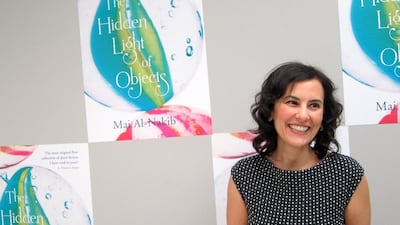When Saddam Hussein ordered the attack on Kuwait in 1990, Mai Al Nakib was 19. She remembers the drama of skies blackened by burning oilfields and how, in an instant, the entire landscape of her adolescence changed. And this sense of impermanence and confusion characterises most of the narratives in her impressive debut short story collection, The Hidden Light of Objects.
“For people like me, whose childhood was in the 1980s, it almost felt like the way that I grew up was a dream,” she says. “Kuwait was never quite rebuilt in the same way, so it felt like my world was shrinking. The pendulum of conservatism swung towards closed-mindedness, which was completely alien to me.”
Al-Nakib completed her doctorate in English Literature at Brown University in the United States and returned to teach at Kuwait University. But with global events post-September 11 suffocating Al-Nakib even further, she turned to writing – if only to remind herself that life had once been different.
The short stories she has been working on since 2006 are cleverly gathered together in The Hidden Light of Objects: it begins with childhood memories about a trip to Japan, works through teenage angst and ends with middle-aged disappointment.
But its most vivid stories are of young adults from the Middle East, bursting with potential but dragged down by their situation and surroundings.
In the most heartbreaking tale, Playing with Bombs, Nimr falls for the Medusa-like Sireen but gets entangled in a suicide bomb plot. "We were hopeful and we were special," he says, from beyond the grave.
“I think that time of your life is a place you always want to go back to, because it’s such a source of excitement about everything the world can offer,” says Al Nakib. “But although there is a lament for a certain way of life in these stories, I really didn’t want them to be just nostalgic. I’m trying to open up a space to suggest a possible future for the region, too.
“What encourages me is that while my generation carries a burden of memories, the kids I teach don’t have that emotional baggage. We’re even past the point where September 11 is a pivotal moment for them, which makes me quite optimistic about the future.”
Still, as Erika Banerji wrote in an enthusiastic recent review of the book in The National, Al Nakib has an “exceptional eye for the bruised landscape of the modern Middle East”. The stories feel real, born of hard-won experience.
“I wouldn’t say they are autobiographical, but I do feel living in this part of the world there is always a feeling of instability lurking somewhere,” she says. “That, perhaps, your home is never quite your home. When I was much younger, I would ask myself, ‘If something happens, what would I take with me?’ – and I actually had a bag of things I kept in thecupboard.
“I’m not sure how I acquired that feeling of impermanence, but everything I have become is because of these instabilities and uncertainties. Do I even want to belong to a place? I’m not so sure.”
Al Nakib, though, is certain of her next move. She’s graduating from writing this short story collection to a full novel – which will have some of the same themes, if not the same characters.
“I’m really excited to be involved in a longer form,” she says. “The short stories are so unforgiving to write – but they’ve given me the ability to think about my book in chapters rather than trying to grapple with this huge unwieldy novel. I’m really enjoying it.”
• The Hidden Light of Objects (Bloomsbury Qatar Foundation Publishing) is out now
artslife@thenational.ae

